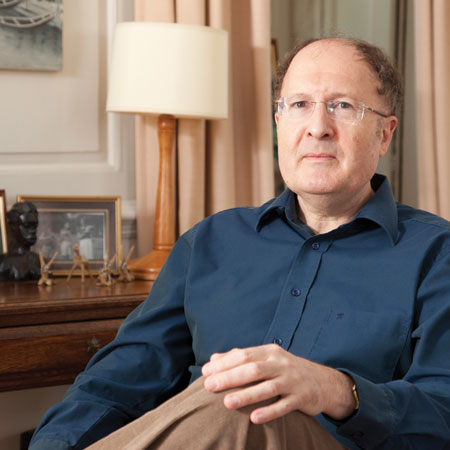INTERVIEW: Humanizing Antibodies And Inventing Humira; Greg Winter's Story So Far
Executive Summary
Biochemist Greg Winter has scientifically contributed to some of the pharmaceutical industry's biggest commercial and therapeutic success stories. He tells Scrip how he feels about being labelled a pioneer and why he is still wary of the boardroom.
Travelling to Cambridge to meet Sir Gregory Winter on a beautifully blue day is a little like taking a holiday into a world of intellectual prowess that few have the opportunity to experience. Even the taxi driver is listening to 'Summer' from Vivaldi's violin concerto The Four Seasons. Nestled among this university city's winding River Cam and pockets of college tourists wearing sweatshirts emblazoned with their adopted college is Winter's alma mater, Trinity College. And it is here that he is now Master, having been installed in 2012.
Met at the Master's Lodge by an aproned butler named Paul, he shows me around the rooms while we make our way to the Master's boardroom. Portraits of kings, queens and distinguished Trinity College alumni look down, all dominated by large portraits of Queen Elizabeth I and Sir Isaac Newton.
Although it is not Trinity College that we are here to discuss, history will undoubtedly look back at the man that I have come to meet and attribute huge scientific significance to his work. A biochemist, Winter's pioneering research into therapeutic monoclonal antibodies led to the development of methods for making human therapeutic antibodies. Previously, antibodies had been derived from mice, which made them difficult to use in humans because the human immune system recognized them as foreign. Winter invented techniques to humanize mouse antibodies for therapeutic use, and later to make fully human antibodies.
Sir Gregory Winter Medical Research Council
The technology Winter developed appears to be used in most of the approved therapeutic antibodies today. The first fully-human antibody drug,adalimumab, was created by Winter's first company Cambridge Antibody Technology Group PLC (CAT) together with BASF Corp. and later picked up by Abbott Laboratories Inc. This antibody, now marketed as Humira, has topped the charts as the best-selling pharmaceutical drug of recent years, and is used to treat patients for rheumatoid arthritis, plaque psoriasis, Crohn's disease, ulcerative colitis and psoriatic arthritis, among others.
When I ask Winter how he feels about being labelled by many as a pioneer he looks into the walled Master's garden below us, and smiles. "Well that depends," he says, "a pioneer of what?" Winter is comfortable with being labelled as a biotech pioneer, although he accredits luck to what he describes as "transformative" work, and admits that at the time he didn’t realize quite how significant it would be. If people consider him to be an industry visionary, he says, that would be a mistake. "I am a good scientist who was lucky; I was only interested in industry to the extent I needed to turn my ideas into medicines,"
"I’m not even a good businessman," he chuckles. "If I had been I wouldn’t have made billions for other people and so much less for myself."
If Winter doesn’t believe himself to be a good businessman, he will at least admit that he is a very hard working one. Launching CAT in 1989 with David Chiswell, the Medical Research Council (MRC) and with a major scientific contribution from John McCafferty, Winter divided his time between his academic work and the company, working what "seemed like seven days a week for seven years".
"It was just so hard," he recalls, "keeping up that level of commitment, I threw everything into it. At that stage, we didn’t know for sure that it would all work out so well, because in the early 1990s, there was nothing to indicate that antibodies were going make it as mainstream pharmaceuticals. We didn’t even know whether human antibodies would have an edge over humanized antibodies in the clinic. Actually, they probably don’t, but people thought that they might, which was one reason they invested in CAT. That isn’t to say that we didn’t develop a good product with the folks at BASF Pharma."
Serial Biotech Entrepreneur
The success of CAT's research, and the possibility that large pharma might find themselves locked out of technologies for making human antibodies, meant that big pharma came courting; in 2006 AstraZeneca PLC bought the company for £702m. AZ subsequently bought MedImmune LLC for $15.6bn and merged the two operations to form its biologics arm. [See Deal]
Not put off by the sheer level of work required to form CAT, in 2000 Winter formed his second company, Domantis Ltd. with Ian Tomlinson, although Winter freely acknowledges that Tomlinson, as chief scientific officer, carried the much larger burden of work after foundation. Domantis pioneered the development of smaller antibodies based on single, rather than paired, domains. The use of single domains also potentially simplified the construction of bispecific antibodies directed against more than one disease target.
GlaxoSmithKline PLC bought Domantis for £230m in 2006 to become part of its Biopharmaceuticals Centre of Excellence for Drug Discovery. [See Deal]
When asked about his level of comfort at being at the sharp end of a boardroom, Winter says he is still a scientist first and foremost, with the business only coming as an enabler of the fruits of the research. "I’ve always been in academia and I’ve never jumped full-time into a company. People said, ‘You can’t have your cake and eat it.’ I said, ‘Why not? What gives you the right to moralize?’ I am basically an academic with an interest in practical things, but my ideas would have remained as scientific curiosities, unless I had refined them in the fire of the market. That’s why I started the companies."
Sir Gregory Winter wins Scrip's Lifetime Achievement Award in 2015
Scrip
One might be forgiven for assuming that the quintessentially English Winter might be a touch meek when dealing with company boards. You'd be wrong. He tells me a story of his time on the board of Peptech Ltd, the Australian investors in both CAT and Domantis. Faced with open hostility from the new chairman who did not believe that Peptech should have invested in Domantis, Winter (who had been co-opted to the board of Peptech as part of the deal) was careful to attend the board meetings, especially those called at minimum notice in Australia - he suspects in the hope that he would be unable to show up. At board meetings, he decided to take a stand and argue his corner, and did so to the irritation of the chairman until such time as investors managed to engineer the chairman’s resignation.
Generally Winter is wary about boards – in his view so much depends on the integrity and competence of the chairman and the diligence and independence of the board members, neither of which should be taken for granted. The danger of boards, he claims, is "the easy consensus" under which board members may feel absolved from taking personal responsibility for poor collective decisions.
Despite the occasionally difficult experiences of working in the boardroom, Winter is now on to his third company, Bicycle Therapeutics Ltd. This company, which is again based on Winter's research, is developing bicyclic peptides (Bicycles) combining the therapeutic benefits of antibody-like binding, small-molecule tissue penetration within one molecule, plus excretion through the kidneys. Their small size enables rapid and deep tissue penetration, allowing tissues and tumours to be targeted from within.
Kevin Lee, Bicycle's CEO, describes Winter as "entrepreneurial, very down to earth and approachable". To work with, Lee says that Winter is a "great team player, able to think outside the box and ready to bring new dimensions to any discussion."
Winter has an unrelenting drive to create therapeutics based on his ground-breaking research. He has also surrounded himself with peers who have the same attitude. "‘You’re only as good as the next thing you do.’ That was [Nobel-prize winning biochemist and member of CAT's scientific advisory board] César Millstein's thinking. There’s certainly more we can do, and so I think we should get on and do it,” he states.
In 1997 he was appointed CBE in Her Majesty the Queen's New Year's Honours List for services to science. In 2004 Winter became a Sir Gregory when he received a Knighthood for services to molecular biology. He was elected a Fellow of the Royal Society and awarded the Royal Medal by the society in 2011 "for his pioneering work in protein engineering and therapeutic monoclonal antibodies, and his contributions as an inventor and entrepreneur".
To Africa And Back
Winter smiles as he thinks about what his father would have thought of his success, of the millions of people that take drugs such as Humira, Benlysta (belimumab) and Herceptin (trastuzumab) which are all based on his research. "He was not given to lavish praise. He probably would have said 'Well, not bad. It makes me feel better about all those school fees.'"
Winter was born six weeks prematurely in April 1951. With post-war coal rationing still in place, his mother found it increasingly difficult to heat the family home and keep her young son warm enough. By serendipity, Winter's father found a post in West Africa's Gold Coast, Ghana as it is now, to teach French and by September 1951, before the English cold set in, Winter was thriving in the African heat.
Despite contracting malaria and other tropical fevers Winter says that he owes Africa his life. "If I'd been stuck in the UK with coal rationing, I probably would have been done for despite our wonderful NHS."
By his teenage years, the family had returned to England, and he proved to be academically gifted and won a scholarship to study Natural Sciences at Trinity College. It was here that the young scientist found himself tested and questioned by his "terrifying" supervisor at Trinity. Wanting to discuss some interesting results, he was met with the advice: "Bugger interesting, is it an important question? Don’t mess around with results that suggest or imply something. Do it properly, prove it - put a stake through its heart."
"Actually, it’s advice I’ve taken," says Winter. "The world is all too full of interesting questions, many of which turn out to be uninteresting when you finally know the answer. If you’re going to do something, do something important because it’s not worth wasting your time if it isn’t."
Long-Term Ambition
When asked what is left for him to achieve Winter says that he would like to live long enough to make a profit from his pension contributions. But on a more serious note, the life that lies ahead of him is a paradox. While wanting to still "be useful, in some context or another", Winter would also like more time to himself than his current role at Trinity College allows.
He'd like to be able to enjoy the weather on a sunny day, or spend more time reading, he says. In contradiction to what he has previously espoused about the fundamental questions one should ask as a scientist, as a human being he'd like to spend some time pondering the not-so-important questions in life, such as the history of the English moat, for example. And given the scientific breakthroughs his work has attributed to, anyone would agree that he has earned that much.
